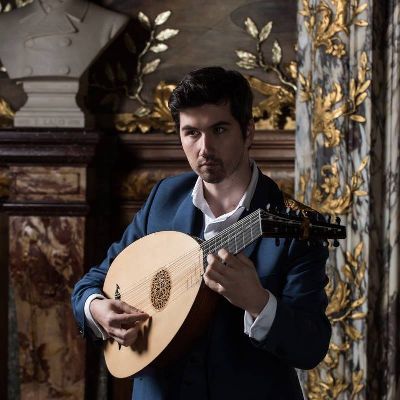Davies and Dunford provide a season highlight with Orphic program in Washington

Iestyn Davies performed a recital for Vocal Arts DC Tuesday night at the Kennedy Center’s Terrace Theater.
The debut of countertenor Iestyn Davies and lutenist Thomas Dunford on the Vocal Arts DC series, in 2014, was a season highlight. Their return to the Washington series, in a concert at the Kennedy Center Terrace Theater Tuesday night, was on the same high level.
The program featured vocal pieces by three British composers, all of whom were compared to the legendary musician Orpheus, as well as pieces for lute by J. S. Bach, “Germany’s Orpheus,” as Davies put it.
The British countertenor’s voice is so dulcet, so seamlessly joined register to register, that it was a multi-faceted jewel in the simple setting of Dunford’s soft accompaniment on the archlute. The combination was strongest in pieces actually conceived for the lute by John Dowland, in a set on the first half. Dunford showed off his facility in melodic runs and complex polyphonic writing in “Praeludium / A Dream,” as well as expressive power in an aching rendition of “Lachrimae.”
The latter piece is an instrumental rendition of the lute song “Flow, My Tears,” to which Davies gave a tragic sheen, reaching up to achingly pure high notes at “Happy, happy they that in hell.” Another flourish into even higher territory marked the end of “Behold a Wonder Here,” enlivened by the lute’s rhythmic activity. Dunford’s varied accompaniment patterns from verse to verse also animated the spritely air “Can She Excuse My Wrongs?”
Although there was some repetition in the Dowland selections from their 2014 recital, with such excellent music-making it hardly mattered. A single Dowland song, “Come Again, Sweet Love,” was one of the highlights of the second half, with brightly varied lute accompaniment verse to verse and another escapade into Davies’ upper range.
Music by Henry Purcell worked quite well on the lute, many of them recorded by this duo. This included more serious, even religious pieces like “Lord, What Is Man?” with its rising chromatic lines and running notes on the concluding “Hallelujah.” The Petrarchan contrasts of “Sweeter than Roses,” now ice cold and then shot with fire, provided a pleasing secular complement to it.
Each of the Purcell pieces on the second half was a delight, beginning with the utterly disarming “Music for a While,” unfortunately marred by an errant cell phone ring at the coda. The somber “O Solitude,” on a text by the extraordinary 17th-century poet Katherine Philips, tested the extreme low range of Davies’ voice. At the same time Dunford struggled a bit here with the intonation of his instrument’s low strings.
Least successful were the adaptations of three arias by Handel, where the lute could not provide enough power at times for the vocal writing, as in the otherwise beautiful “Ombra cara” from the opera Radamisto. The solo cantata Hendel, non può mia musa, although perhaps not great music, was an irresistible work for its textual comparison of the composer to Orpheus. Most effective was “Oh Lord, Whose Mercies Numberless” from the oratorio Saul, given an elegant, solemn performance.
Between the vocal pieces Dunford provided an endlessly diverting series of solo works, many of them adapted from pieces for other instruments. His recording of his own transcription of Bach’s Solo Cello Suite in G Major was one of last year’s best discs. It was no less beautiful performed live, sprinkled throughout the second half, during which the audience refrained from applauding at the request of the performers, providing a half-hour of blissful, quiet introspection.
The final Purcell work, “An Evening Hymn,” was simply gorgeous, leading to two more contemporary, highly contrasted encores: the Shakespearean “Orpheus with his Lute” by Vaughan Williams, followed by the heart-breaking “Tears in Heaven” by Eric Clapton.
The program will be repeated 7:30 p.m. Thursday at Zankel Hall. carnegiehall.org
